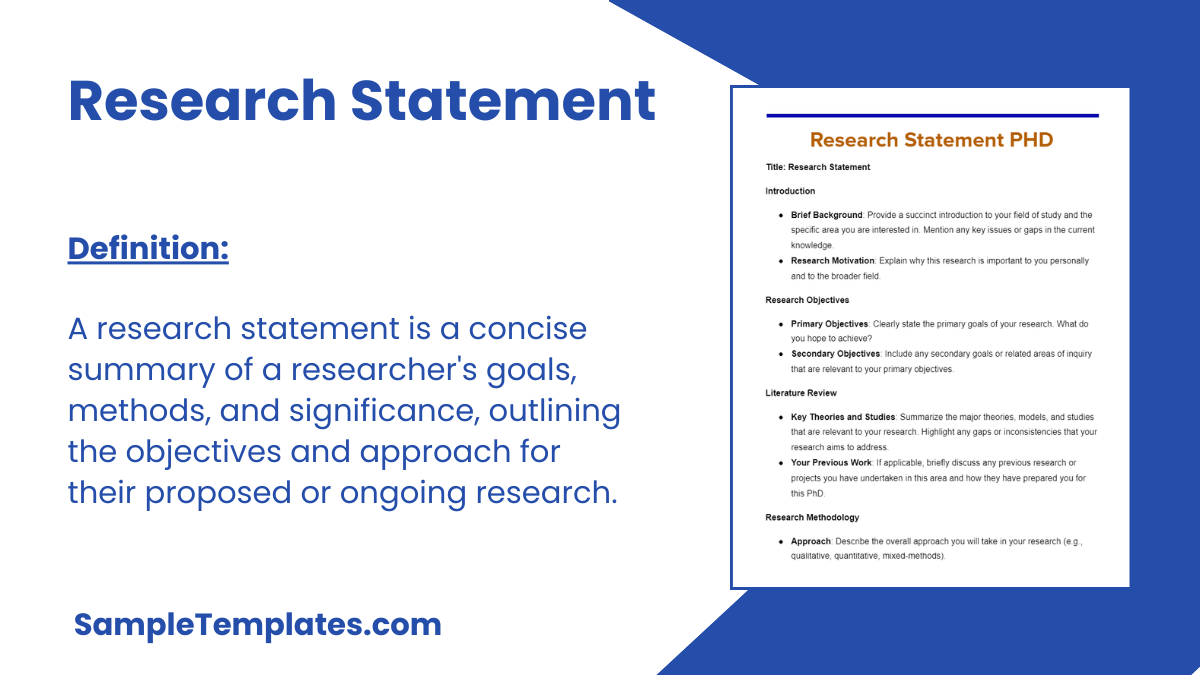A research statement is a summary of your research and achievements in past projects acting as a sample proposal for your next research. It will, in most cases, include both current scenarios and data along with future predictions and goals. Research statements are also a crucial part of special job applications, helping recruiters identify the appropriate candidate. It’s all about introducing you and your work to a higher authority and making a mark with your past records. Check out some such Sample Statements, applicable in a variety of situations.
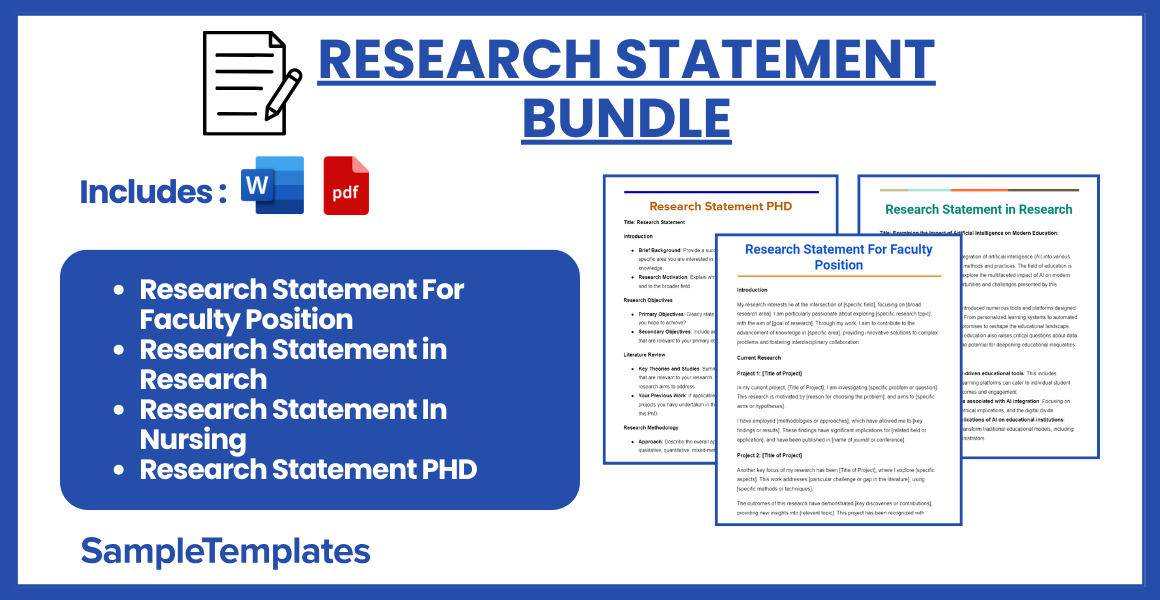
Download Research Statement Bundle
Research Statement For Faculty Position
Introduction
My research interests lie at the intersection of [specific field], focusing on [broad research area]. I am particularly passionate about exploring [specific research topic], with the aim of [goal of research]. Through my work, I aim to contribute to the advancement of knowledge in [specific area], providing innovative solutions to complex problems and fostering interdisciplinary collaboration.
Current Research
Project 1: [Title of Project]
In my current project, [Title of Project], I am investigating [specific problem or question]. This research is motivated by [reason for choosing the problem], and aims to [specific aims or hypotheses].
I have employed [methodologies or approaches], which have allowed me to [key findings or results]. These findings have significant implications for [related field or application], and have been published in [name of journal or conference].
Project 2: [Title of Project]
Another key focus of my research has been [Title of Project], where I explore [specific aspect]. This work addresses [particular challenge or gap in the literature], using [specific methods or techniques].
The outcomes of this research have demonstrated [key discoveries or contributions], providing new insights into [relevant topic]. This project has been recognized with [awards, grants, or recognition], and has paved the way for further exploration in [related area].
Future Research Directions
Building on my previous work, I intend to pursue several new avenues of research that will deepen our understanding of [broad research area]. My future research will focus on the following themes:
Theme 1: [Title or Description of Theme]
I plan to investigate [specific question or problem] with the goal of [specific objective]. This research will utilize [new methodologies or technologies], and aims to [expected outcomes or contributions].
Theme 2: [Title or Description of Theme]
Another important direction for my future research is [specific aspect]. This will involve [methods or approaches], aiming to [specific aims]. I anticipate that this work will [potential impact or significance], contributing to [related field].
Interdisciplinary Collaboration and Impact
I am committed to fostering interdisciplinary collaboration, recognizing that complex problems often require diverse perspectives and expertise. My research has involved collaborations with [other fields or disciplines], leading to [outcomes or benefits].
Through these collaborative efforts, I aim to create [broader impact], addressing [specific societal challenges or needs]. My work strives to bridge the gap between [specific fields], promoting innovation and knowledge transfer.
Teaching and Mentorship
In addition to my research, I am dedicated to teaching and mentorship. I believe that [teaching philosophy or approach], and I have taught [specific courses or subjects], emphasizing [key teaching strategies].
I have mentored [number] students and junior researchers, guiding them in [specific areas or projects]. My approach to mentorship focuses on [mentorship philosophy], aiming to [goals for mentees].
Conclusion
In conclusion, my research to date has focused on [summary of research area], leading to [key contributions or findings]. Moving forward, I am excited to explore [future research directions], with the aim of [long-term goals]. I am confident that my work will continue to contribute to [field], and I look forward to the opportunity to collaborate with colleagues and students at [name of institution].
Thank you for considering my application.
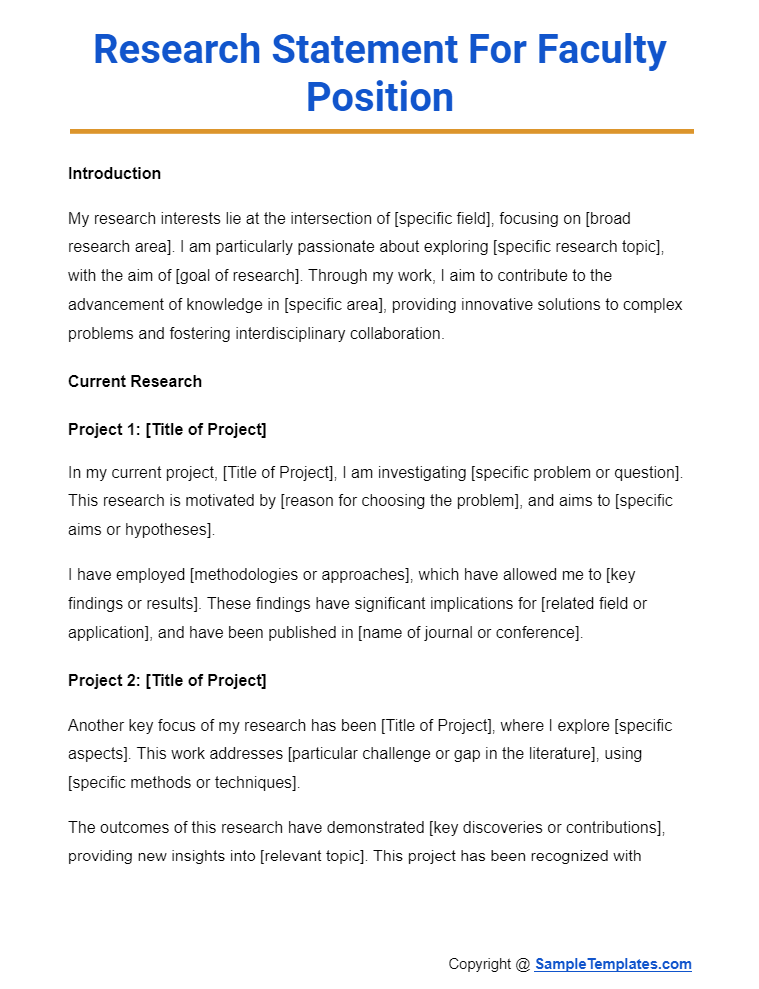
Research Statement in Research
Title: Examining the Impact of Artificial Intelligence on Modern Education: Opportunities and Challenges
Introduction: In recent years, the integration of artificial intelligence (AI) into various sectors has revolutionized traditional methods and practices. The field of education is no exception. This research aims to explore the multifaceted impact of AI on modern education, highlighting both the opportunities and challenges presented by this technological advancement.
Background: The advent of AI has introduced numerous tools and platforms designed to enhance educational experiences. From personalized learning systems to automated grading and administrative tasks, AI promises to reshape the educational landscape. However, the implementation of AI in education also raises critical questions about data privacy, ethical considerations, and the potential for deepening educational inequalities.
Research Objectives:
- To analyze the benefits of AI-driven educational tools: This includes examining how personalized learning platforms can cater to individual student needs, improving learning outcomes and engagement.
- To investigate the challenges associated with AI integration: Focusing on issues such as data security, ethical implications, and the digital divide.
- To assess the long-term implications of AI on educational institutions: Understanding how AI could transform traditional educational models, including the roles of teachers and administrators.
- To provide recommendations for policymakers and educators: Ensuring the responsible and equitable implementation of AI in education.
Methodology: This research will employ a mixed-methods approach, combining qualitative and quantitative data collection and analysis. Surveys and interviews with educators, students, and AI developers will provide insights into the practical experiences and perceptions of AI in education. Additionally, case studies of institutions that have successfully integrated AI will offer models for best practices. Quantitative data will be gathered through analysis of educational performance metrics before and after AI implementation.
Expected Outcomes:
- Identification of key benefits: Improved student performance, increased efficiency in administrative tasks, and enhanced personalized learning experiences.
- Highlighting of major challenges: Ethical concerns, data privacy issues, and the risk of exacerbating educational inequalities.
- Strategic recommendations: Guidelines for policymakers and educators to mitigate challenges and maximize the benefits of AI in education.
Conclusion: The integration of AI into the educational sector holds significant promise for transforming learning and teaching methodologies. However, it is imperative to address the associated challenges to ensure that the benefits are equitably distributed. This research aims to contribute to the ongoing discourse on AI in education, providing a balanced perspective on its potential and pitfalls.
Keywords: Artificial Intelligence, Education, Personalized Learning, Data Privacy, Educational Inequality, AI Ethics.
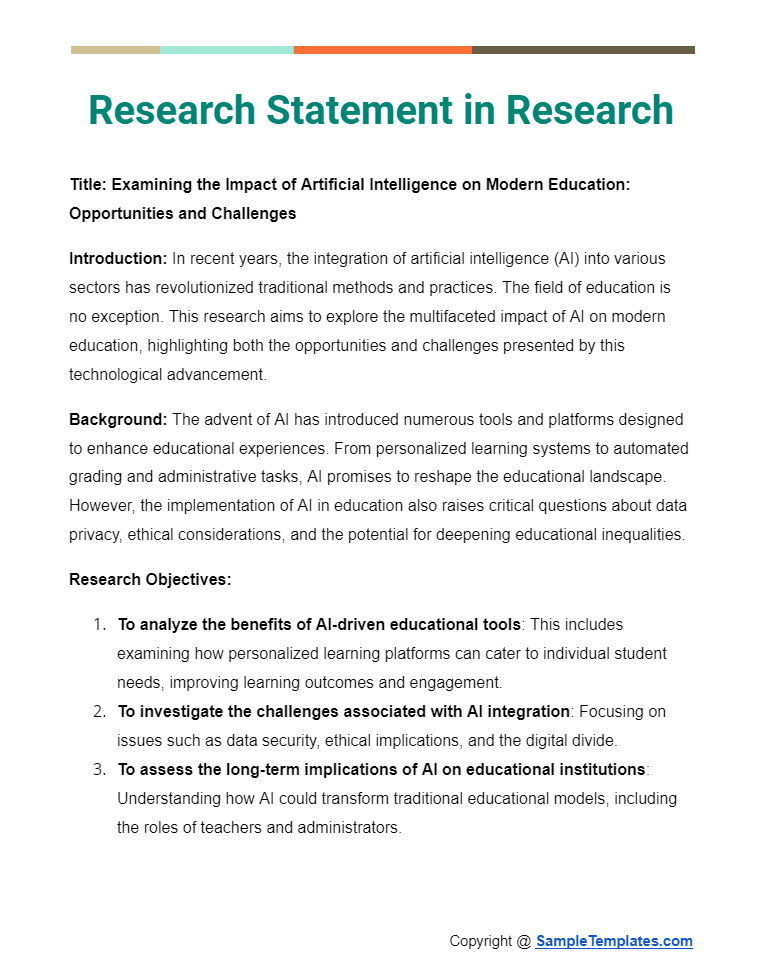
Research Statement In Nursing
Title: Improving Patient Outcomes through Enhanced Nursing Practices: A Focus on Evidence-Based Care
Introduction: The evolving landscape of healthcare demands a continuous enhancement of nursing practices to improve patient outcomes. The primary objective of my research is to investigate the impact of evidence-based nursing interventions on patient recovery, satisfaction, and overall healthcare quality. This research will bridge the gap between theoretical knowledge and practical application, aiming to provide a robust framework for nursing professionals to adopt evidence-based practices in their daily routines.
Research Questions:
- What is the correlation between evidence-based nursing practices and patient recovery rates in acute care settings?
- How do specific evidence-based interventions influence patient satisfaction and perceptions of care quality?
- What are the barriers to implementing evidence-based practices among nursing staff, and how can they be effectively addressed?
Objectives:
- To assess the effectiveness of evidence-based nursing interventions on patient recovery times and outcomes.
- To evaluate patient satisfaction levels before and after the implementation of evidence-based nursing practices.
- To identify the challenges faced by nursing staff in adopting evidence-based practices and propose strategies for overcoming these obstacles.
Methodology: This research will employ a mixed-methods approach, combining quantitative and qualitative data collection techniques. Quantitative data will be gathered through patient records, surveys, and statistical analysis of recovery times and satisfaction scores. Qualitative data will be obtained via interviews and focus groups with nursing staff and patients to gain deeper insights into their experiences and perceptions.
Significance: The findings of this research will contribute significantly to the field of nursing by providing empirical evidence on the benefits of evidence-based practices. The anticipated outcomes include improved patient recovery rates, enhanced patient satisfaction, and a more efficient and effective healthcare delivery system. Additionally, the research will offer valuable recommendations for nursing education and policy development, promoting a culture of continuous improvement and professional growth within the nursing community.
Conclusion: In conclusion, this research aims to underscore the critical role of evidence-based nursing practices in improving patient outcomes. By addressing the current gaps in practice and providing actionable insights, this study will support the advancement of nursing as a science and an art, ultimately leading to better healthcare for all.
Keywords: Evidence-Based Nursing, Patient Outcomes, Nursing Interventions, Healthcare Quality, Patient Satisfaction, Nursing Education.
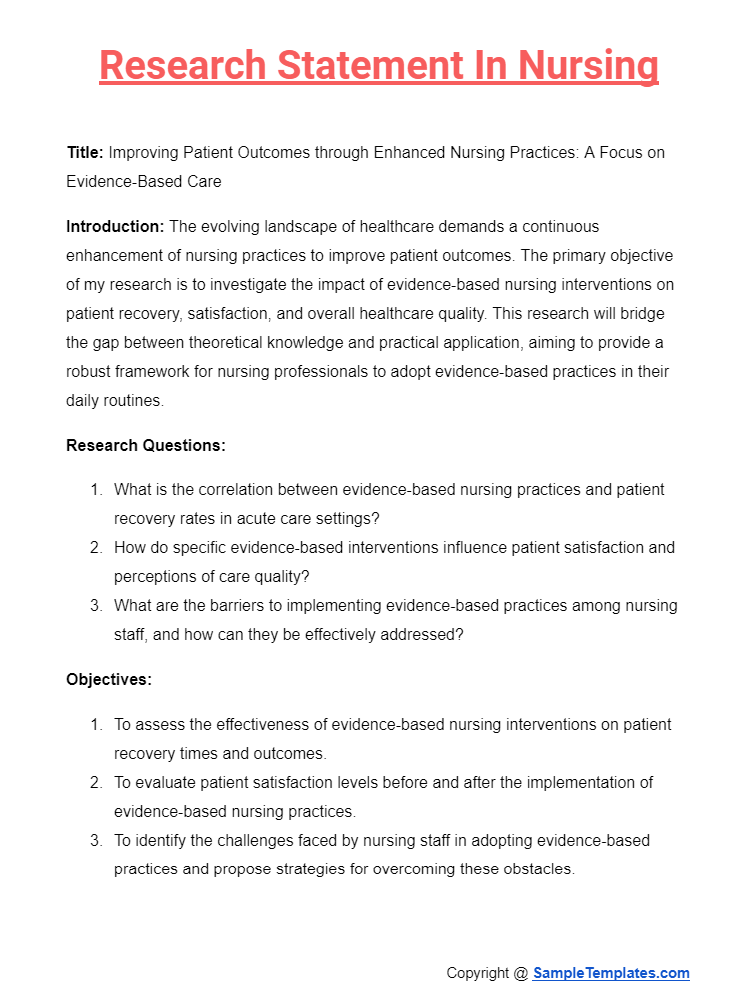
Research Statement PHD
Title: Research Statement
Introduction
- Brief Background: Provide a succinct introduction to your field of study and the specific area you are interested in. Mention any key issues or gaps in the current knowledge.
- Research Motivation: Explain why this research is important to you personally and to the broader field.
Research Objectives
- Primary Objectives: Clearly state the primary goals of your research. What do you hope to achieve?
- Secondary Objectives: Include any secondary goals or related areas of inquiry that are relevant to your primary objectives.
Literature Review
- Key Theories and Studies: Summarize the major theories, models, and studies that are relevant to your research. Highlight any gaps or inconsistencies that your research aims to address.
- Your Previous Work: If applicable, briefly discuss any previous research or projects you have undertaken in this area and how they have prepared you for this PhD.
Research Methodology
- Approach: Describe the overall approach you will take in your research (e.g., qualitative, quantitative, mixed-methods).
- Methods and Techniques: Detail the specific methods, techniques, or experiments you will use. Include information on data collection, analysis, and any tools or software that will be essential.
- Feasibility: Discuss the feasibility of your research plan, including access to necessary resources, data, or equipment.
Expected Outcomes and Impact
- Anticipated Results: Explain what you expect to find or achieve through your research.
- Contribution to the Field: Discuss how your research will contribute to the existing body of knowledge. Mention any potential practical applications or implications for policy, practice, or further research.
- Broader Impact: Highlight the broader societal, environmental, or economic impacts your research may have.
Alignment with the Program
- Fit with Department/Advisor: Explain why you have chosen this specific program and how your research aligns with the department’s strengths, faculty interests, and resources.
- Potential Collaborations: Mention any faculty members you are particularly interested in working with and why.
Conclusion
- Summary of Research Goals: Recap your main research objectives and the significance of your proposed study.
- Long-term Vision: Share your long-term research vision and career goals, and how this PhD program will help you achieve them.
Example Research Statement
Introduction
In recent years, the integration of renewable energy sources into existing power grids has become a critical area of research due to the growing need for sustainable energy solutions. My interest lies in the optimization of energy storage systems to enhance grid reliability and efficiency. This research is motivated by the pressing need to reduce greenhouse gas emissions and transition to a more sustainable energy infrastructure.
Research Objectives
My primary objective is to develop advanced algorithms for the optimization of energy storage systems in power grids. A secondary objective is to assess the economic and environmental impacts of these optimizations on a large scale.
Literature Review
Current literature highlights various methods for energy storage optimization, including linear programming and machine learning techniques. However, there is a lack of comprehensive studies that integrate both economic and environmental factors into the optimization process. My previous research on machine learning applications in energy management has provided a solid foundation for this proposed study.
Research Methodology
I will employ a mixed-methods approach, combining quantitative modeling with qualitative assessments. Specific methods include the development of optimization algorithms using Python and the analysis of economic and environmental data through statistical software. The feasibility of this research is supported by access to extensive datasets from existing renewable energy projects and computational resources available at the university.
Expected Outcomes and Impact
I anticipate developing algorithms that significantly improve the efficiency and reliability of energy storage systems. This research will contribute to the field by providing a holistic approach to energy storage optimization that considers both economic and environmental impacts. The broader impact includes potential policy recommendations for energy storage deployment and contributions to global sustainability goals.
Alignment with the Program
This PhD program offers a unique combination of expertise in renewable energy and computational modeling, making it an ideal fit for my research interests. I am particularly interested in collaborating with Professor Smith, whose work on energy systems optimization aligns closely with my proposed research.
Conclusion
In summary, my research aims to develop innovative solutions for energy storage optimization in power grids, addressing both economic and environmental challenges. This PhD program will provide the necessary resources and mentorship to achieve my long-term goal of contributing to sustainable energy solutions on a global scale.
By following this structure and tailoring each section to your specific research interests and goals, you can create a compelling and coherent research statement for your PhD application.
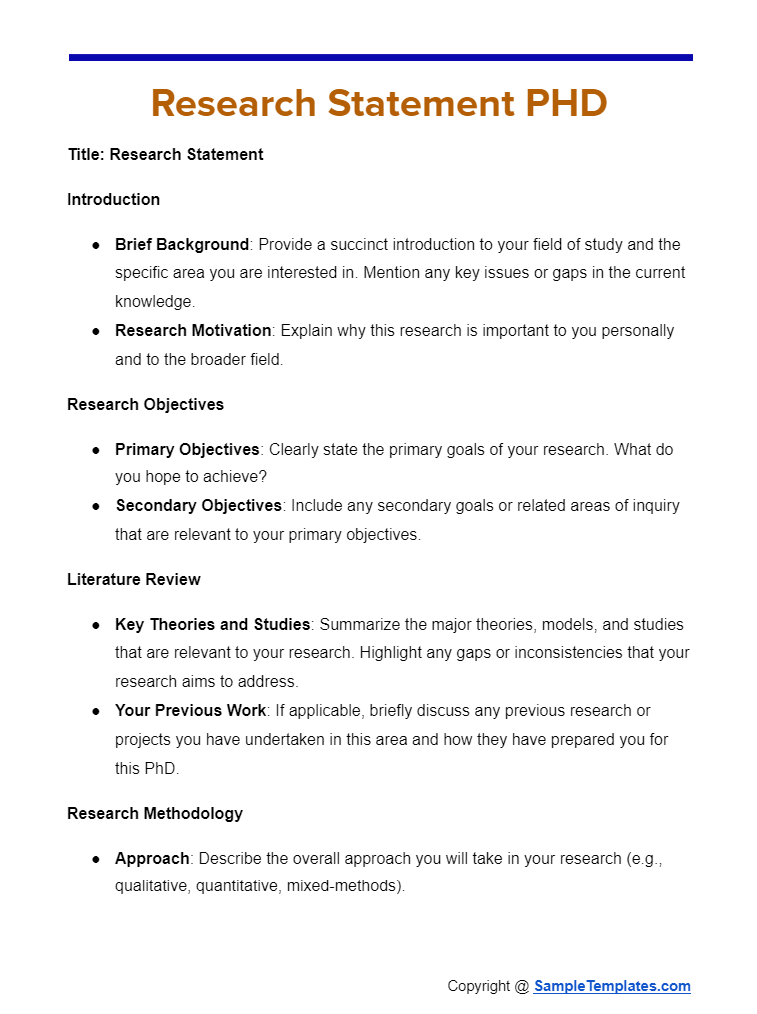
Browse More Templates On Research Statement
Research Problem Statement Template
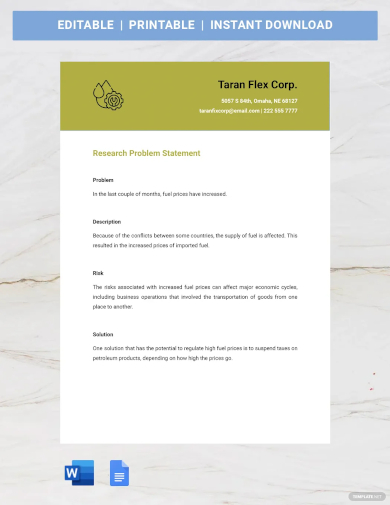
Sample Research Statement and Proposal Template
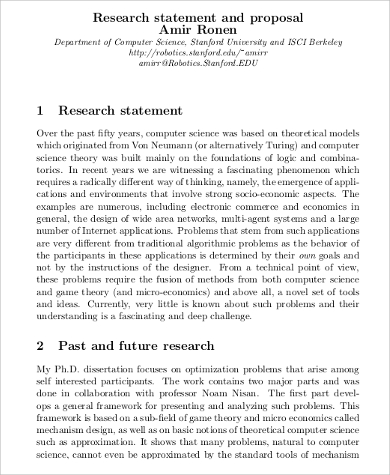
Details
File Format
Size: 51 KB
DownloadThe research statement can be written to discuss various issues, ranging from funding history and the research potential to the need of laboratory equipment, space or industry collaborations.
Statement of Research Interest in PDF
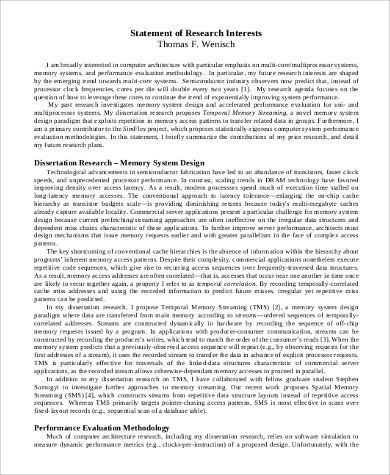
Details
File Format
Size: 26 KB
DownloadThe statement of research interests is again like the statement of intent that puts out your personal statement as a letter of intent while showcasing your qualifications, purpose, and methods of the intended research.
Purpose of a Research Statement
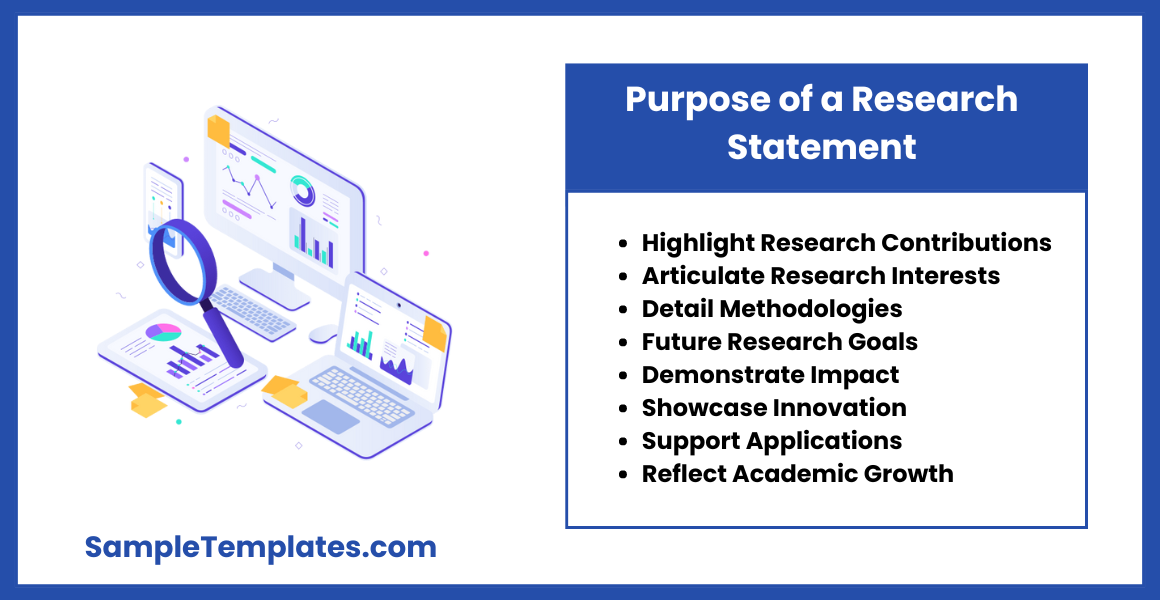
- Highlight Research Contributions: Showcase your key research achievements and contributions to your field.
- Articulate Research Interests: Clearly express your current research interests and areas of expertise.
- Detail Methodologies: Explain the methodologies and approaches used in your research.
- Future Research Goals: Outline your future research plans and objectives.
- Demonstrate Impact: Show the impact and significance of your research on your field and society.
- Showcase Innovation: Highlight innovative aspects of your work and how it advances knowledge.
- Support Applications: Provide essential information for job applications, grant proposals, and academic promotions.
- Reflect Academic Growth: Demonstrate your academic journey, growth, and commitment to ongoing research.
Free Department Research Statement Template
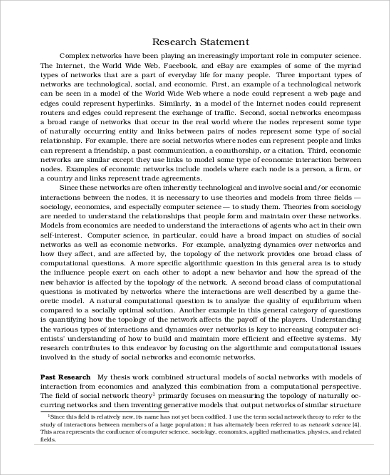
Details
File Format
Size: 59 KB
DownloadA department research statement comes from a particular department of an institution (it could be a school, college, university, hospital or even a commercial establishment) and showcases the context of research work.
How to come up with a Successful Research Statement?
The purpose of a research Statement Samples, as discussed is to introduce yourself and your work to a research committee and this will probably be constituted of well-known scientists, both from inside and outside your field of sample study. It is thus necessary that you are precise and don’t make the statement too long.
The rule of thumb will be to squeeze everything into two pages. It is important that you keep a realistic balance between the research statements. You will also need to be attentive to jargons, and it could be highly helpful if you can earn some strong collaboration that shows well on sample paper. Include anything that sets you apart, but there will be no excuses for any kinds of errors.
How to Write a Research Statement?
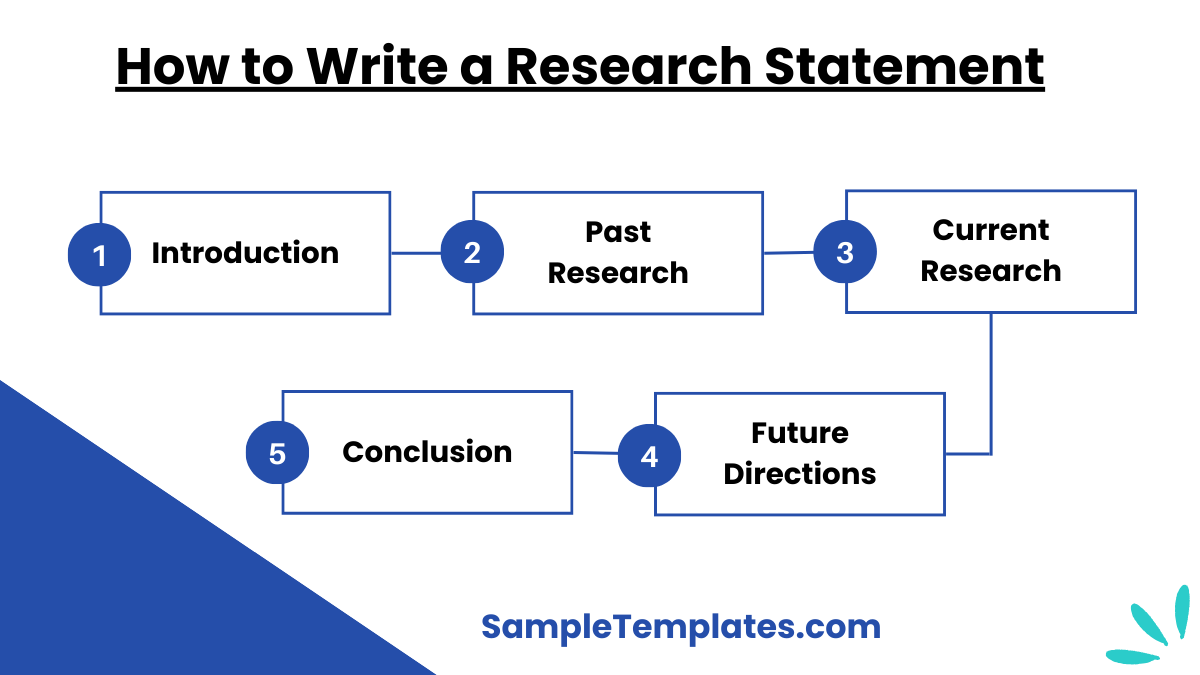
- Introduction:
- Begin with a brief introduction that provides an overview of your research area and its significance.
- State your research objectives and why they are important. You can also see more on Brief Research Statement.
- Past Research:
- Summarize your previous research projects, including methodologies, key findings, and contributions to your field.
- Highlight any notable publications, presentations, or collaborations.
- Current Research:
- Describe your current research projects in detail, including specific goals, methods, and expected outcomes.
- Explain how your current work builds on your past research and addresses important questions in your field.
- Future Directions:
- Outline your future research plans, including new projects, potential collaborations, and long-term goals.
- Discuss the broader impact of your future research and how it will advance your field.
- Conclusion:
- Summarize the key points of your research statement.
- Reiterate your commitment to your research area and its significance.
- End with a strong statement about your vision for the future and your enthusiasm for continuing your research journey. You can also see more on Short Research Statement.
Research Interact with Human Statement Example
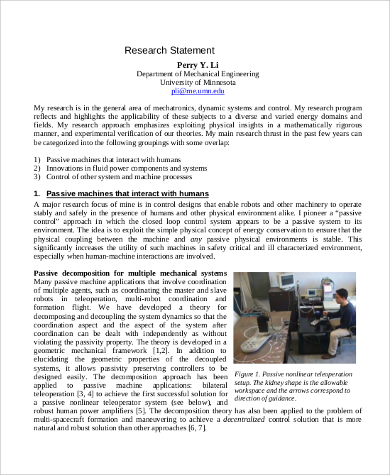
Details
File Format
Size: 156 KB
DownloadIf the research work constitutes human interviews and behavioral experiment of any kind, the letter of intent should also be accompanied by a thorough statement of this interaction that is going to take place. This is especially required if you are going to conduct the research in a professional premise.
Basic Research Problem Statement Template
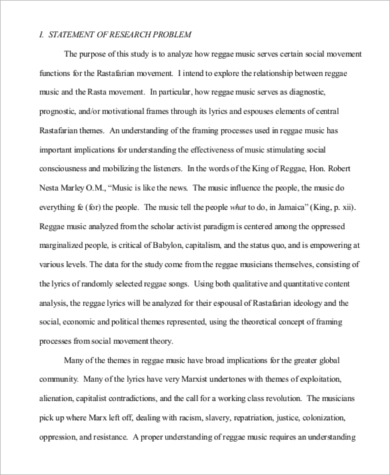
Details
File Format
Size: 347 KB
DownloadIn a generalized kind of statement of research, the applicant needs to put forward a problem that the research intends to resolve. This is what we know as the research problem statement sample.
Formal Research Personal Statement Template
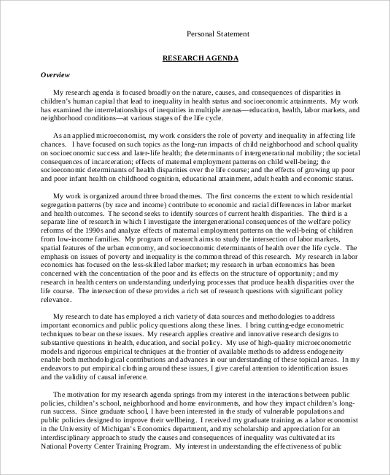
Details
File Format
Size: 9 KB
DownloadWho needs to write a Research Statement?
A research statement is asked from anyone who is looking to rope in some funding for his/her personal research work. The work is always associated with some study and is done in collaboration with institutions – colleges, universities or organizations. You can also see the Problem Statement Samples.
Depending on the nature of your research, you may also need to write to local authorities and anyone’s premises you might be conducting your surveys/experiments at. While a research statement is especially needed by Ph.D. candidates, anyone can hope to make use of it to create a better impression.
Sample Research Statement Summary Template

Details
File Format
Size: 249 KB
DownloadResearch Statement Analysis Template
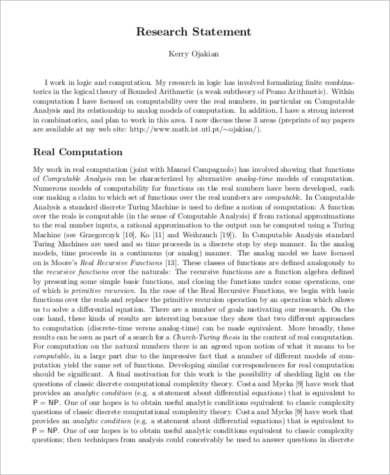
Details
File Format
Size: 71 KB
DownloadTypes of Research Statements
- Academic Job Research Statement:
- Used when applying for faculty positions. You can also see more on Undergraduate Research Statement.
- Focuses on past research accomplishments, current projects, and future research plans.
- Demonstrates alignment with the hiring institution’s goals and research priorities.
- Grant Proposal Research Statement:
- Part of funding applications.
- Emphasizes the significance, feasibility, and impact of the proposed research.
- Includes detailed methodologies, objectives, and expected outcomes.
- Postdoctoral Research Statement:
- For postdoctoral fellowship applications.
- Highlights doctoral research achievements and outlines postdoctoral research plans.
- Shows how the postdoc work will build on previous research and contribute to the field.
- Tenure and Promotion Research Statement:
- Used in applications for tenure or promotion within academic institutions.
- Summarizes career research achievements, ongoing projects, and future directions.
- Demonstrates a trajectory of growth and significant contributions to the field.
- Industry Research Statement:
- For positions in industry research and development. You can also see more on Scientific Research Statement.
- Focuses on applied research, problem-solving skills, and contributions to product development.
- Highlights how past research can translate to industry applications and drive innovation.
Sample Research Statement Engineering Template
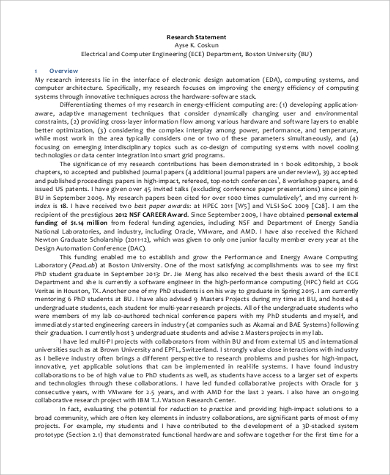
Details
File Format
Size: 277 KB
DownloadResearch Online Statement in Word
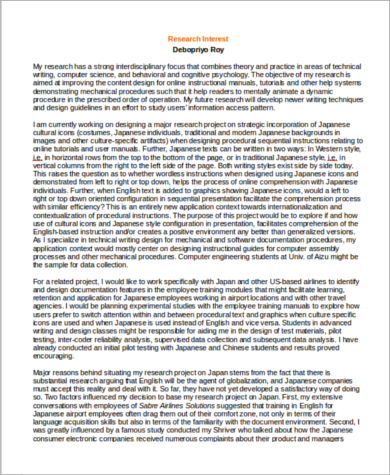
Details
File Format
- DOCX
Size: 6 KB
DownloadAll the above Statement of Purpose Samples have been collected from reputed projects and are intended to help you come up with your unique research statements. Feel free to follow the format and build a powerful content there on.
Is research statement and sop the same?
No, a research statement focuses on research goals and achievements, while a Statement of Purpose (SOP) outlines academic and professional goals for program applications. You can also see more on Research Design Statement.
How to start a thesis statement?
Begin with a specific, clear assertion about your topic, outlining the main argument or purpose of your paper, guiding the reader on what to expect.
How to write a research paper?
Start with a clear thesis, conduct thorough research, organize findings logically, draft detailed sections, cite sources properly, and revise for clarity and coherence. You can also see more on Graduate Research Statement.
How to write a research statement for tenure?
Highlight key research contributions, current projects, and future plans. Demonstrate growth, impact on the field, and alignment with the institution’s goals and priorities.
In conclusion, this research aims to address key challenges by providing actionable insights and innovative solutions. By advancing understanding in this area, it seeks to contribute valuable knowledge and drive meaningful progress in the field.
If you have any DMCA issues on this post, please contact us.
Related Posts
FREE 10+ Engineering Problem Statement Samples [ Software, Mechanical, Civil ]
FREE 30+ Information Statement Samples in PDF | MS Word
FREE 50+ Policy Statement Samples in MS Word | Google Docs | PDF
FREE 50+ Summary Statement Samples in PDF | MS Word
FREE 10+ Nursing School Personal Statement in PDF
FREE 9+ Mortgage Statement Samples and Templates in PDF
FREE 10+ Independent Subcontractor Statement Samples in MS Word | Google Docs | Apple Pages | PDF
FREE 10+ Trust Distribution Statement Samples in PDF
FREE 14+ Compliance Statement Samples & Templates in PDF | MS Word
FREE 10+ Extension Impact Statement Samples in PDF | DOC
FREE 10+ Bank Reconciliation Statement Samples and Templates in PDF | MS Word
FREE 10+ Diversity Mission Statement Samples in MS Word | PDF
FREE 10+ Architecture Statement of Purpose Samples [ Sustainable, Graduate, Master ]
FREE 13+ Project Scope Statement Samples in PDF | MS Word
FREE 11+ Internship Statement of Purpose Samples in PDF | DOC
